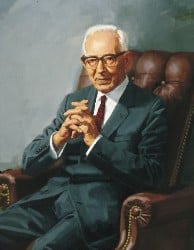
“The grateful man sees so much in the world to be thankful for, and with him the good outweighs the evil. Love overpowers jealousy, and light drives darkness out of his life…Pride destroys our gratitude and sets up selfishness in its place. How much happier we are in the presence of a grateful and loving soul, and how careful we should be to cultivate, through the medium of a prayerful life, a thankful attitude toward God and man!”
| Joseph F. Smith, Gospel Doctrine, 5th ed. (1939), 263.